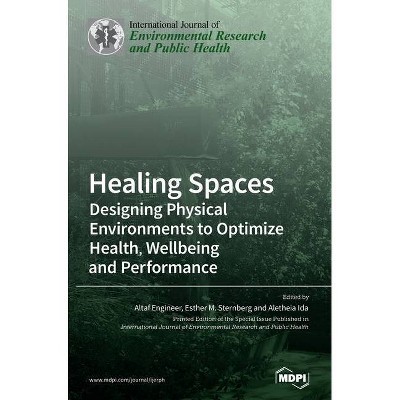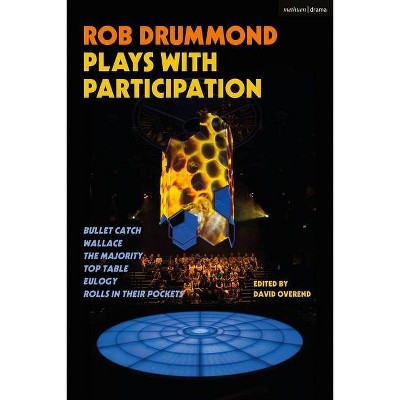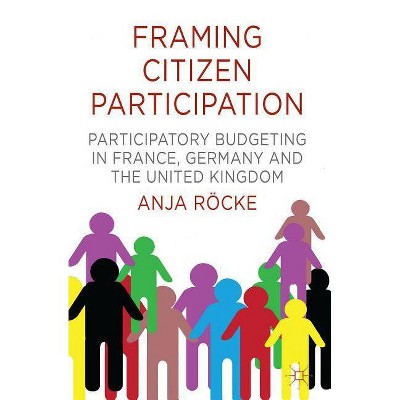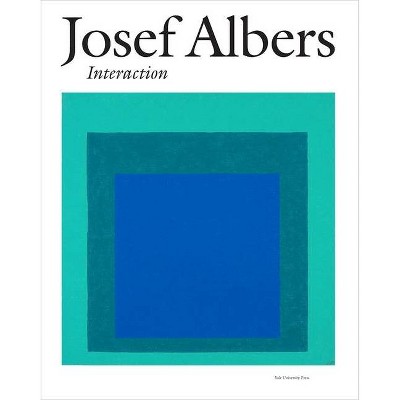Spaces of Participation - by Randa Aboubakr & Sarah Jurkiewicz & Hicham Ait-Mansour & Ulrike Freitag (Hardcover)
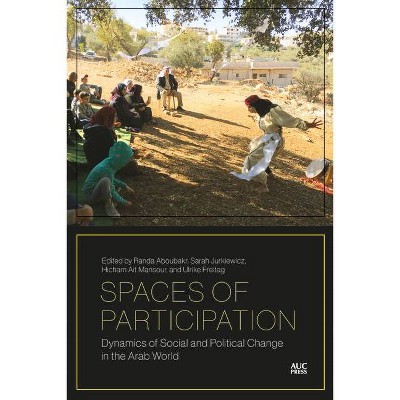
Similar Products
Products of same category from the store
AllProduct info
<p/><br></br><p><b> About the Book </b></p></br></br>"Where do people meet, form relations of trust, and begin debating social and political issues? Where do social movements start? In this fascinating collection, scholars and activists from a wealth of disciplinary backgrounds, including sociology, anthropology, history, and political science, take a fresh look at these questions and the factors leading to political and social change in the Arab world from a spatial perspective. Based on original field work in Egypt, Kuwait, Morocco, and Palestine, Spaces of Participation connects and reconnects social, cultural, and political participation with urban space. It explores timely themes such as formal and informal spaces of participation, alternative spaces of cultural production, space reclamation, and cultural activism, and the reconfiguring of space through different types of contestation. It also covers a range of spaces that include sports clubs, arts centers, and sites of protest and resistance, as well as virtual spaces such as social media platforms, in the process of examining the relationships and tensions between physical and virtual space"--<p/><br></br><p><b> Book Synopsis </b></p></br></br><p><b>A rich interdisciplinary study of the relationships between space, both physical and virtual, and social and political participation</p></b> <p>Where do people meet, form relations of trust, and begin debating social and political issues? Where do social movements start? In this fascinating collection, scholars and activists from a wealth of disciplinary backgrounds, including sociology, anthropology, history, and political science, take a fresh look at these questions and the factors leading to political and social change in the Arab world from a spatial perspective. Based on original field work in Egypt, Kuwait, Morocco, and Palestine, <i> Spaces of Participation</i> connects and reconnects social, cultural, and political participation with urban space. It explores timely themes such as formal and informal spaces of participation, alternative spaces of cultural production, space reclamation, and cultural activism, and the reconfiguring of space through different types of contestation. It also covers a range of spaces that include sports clubs, arts centers, and sites of protest and resistance, as well as virtual spaces such as social media platforms, in the process of examining the relationships and tensions between physical and virtual space.</p> <p><i>Spaces of Participation </i>underlines the temporal and transformative quality of participatory spaces and how they are shaped by their respective political contexts, highlighting different forms of access, control, and contestation.</p> Contributors: <br>Randa Aboubakr, Cairo University, Egypt<br> Hicham Ait-Mansour, Mohamed V University, Rabat, Morocco<br> Fadma Aït Mous, Hassan II University of Casablanca, Morocco<br> Mouloud Amghar, Cadi Ayyad University, Marrakesh, Morocco<br> Yazid Anani, A.M. Qattan Foundation, Ramallah, Palestine<br> Mai Ayyad, Cairo University, Egypt<br> Youness Benmouro, Mohamed V University, Rabat, Morocco<br> Yasmine Berriane, Centre Maurice Halbwachs (CNRS), Paris, France<br> Mokhtar El Harras, Mohamed V University, Rabat, Morocco<br> Ulrike Freitag, Leibniz-Zentrum Moderner Orient, Berlin, Germany<br> Sarah Jurkiewicz, Leibniz-Zentrum Moderner Orient, Berlin, Germany<br> Mona Khalil, Cairo University, Cairo, Egypt<br> Azzurra Sarnataro, La Sapienza University of Rome, Italy<br> Renad Shqeirat, Khalil Sakakini Cultural Center, Ramallah, Palestine<br> Dorota Woroniecka-Krzyżanowska, German Historical Institute, Warsaw, Poland<br><p/><br></br><p><b> Review Quotes </b></p></br></br><br><p>"From art spaces to sports clubs to community gardens to digital realms--the contributors draw our attention to how different groups across the Middle East ascribe social and political meaning to the multiple heterotopic landscapes they inhabit, contest, (re)claim, and indeed produce through participatory practices. The editors have done a wonderful job of bringing together what might seem to be quite different and unrelated case studies (from Cairo to Kuwait to Rabat to the West Bank) in an integrated, innovative, interdisciplinary, and highly readable collection."--<b>Farah Al-Nakib, California Polytechnic State University</b> <p>An engaged and engaging volume, showcasing firsthand ethnographic and interdisciplinary research on the intersection between space and participatory practices across the Arab world. Through varied and empirically rich case studies this collection of essays shows how space (both physical and virtual) is made operational through lived action, and how activism and academia can be combined subtly and fruitfully.--<b>Nelida Fuccaro, New York University Abu Dhabi </b><br><p/><br></br><p><b> About the Author </b></p></br></br>Randa Aboubakr resides in Cairo, Egypt.<br> Sarah Jurkiewicz and Ulrike Freitag reside in Berlin, Germany. <br> Hicham Ait-Mansour resides in Rabat, Morocco.
Price History
Price Archive shows prices from various stores, lets you see history and find the cheapest. There is no actual sale on the website. For all support, inquiry and suggestion messagescommunication@pricearchive.us



